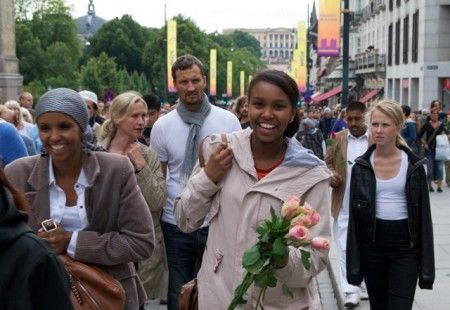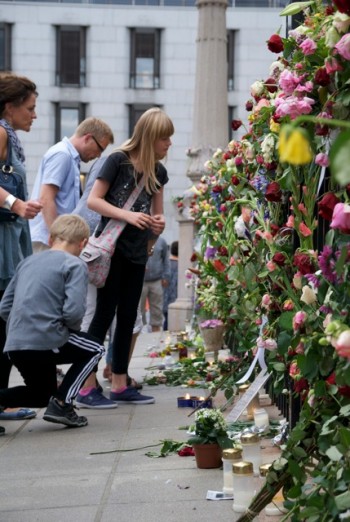The skies cried again over Oslo on Friday, when a torrential downpour hit the capital one week after a bomb ripped through its heart and scores of the country’s youth were gunned down by a lone terrorist. But then the sun came out, and most Norwegians hope that’s what will happen with their society, as signs emerge of a new sense of warmth, enlightenment and unity.

When the bomb first went off, many residents who aren’t ethnically Norwegian felt a special sense of fear and disgust. Many have admitted they also suspected Islamic terrorists at first, and then feared that all residents of Norway who don’t have blonde hair or light skin would become targets of hatred.
“I got lots of calls from anxious cousins in the US who pleaded with us to keep a low profile after the attacks,” Navjot Sandhu, chairman of Oslo minority think-tank Minotenk, wrote in newpaper Dagens Næringsliv (DN). “‘You should ask grandpa to take off his turban,’ they said. ‘We don’t want him to get hurt by some ignorant Norwegian who can’t tell the difference between a Muslim and a Sikh.'” Sandhu admitted that she also suspected Muslims, and that several of her Muslim friends were harassed by people who jumped to the same conclusion.

When the terrorist turned out to be a white, blonde Norwegian who calls himself a Christian and grew up on Oslo’s affluent west side , the mood suddenly changed. While Sandhu still wonders what would have happened “if the terrorist was named Ahmed instead of Anders (Behring Breivik),” she’s mostly glad that the Norwegian defendant’s act has opened people’s eyes to the fact that terrorism is not restricted to any specific nationality or race or religion. The terrorist’s actions last Friday have horrified an entire nation which now happens to be made up of many people with various ethnic backgrounds, not just Norwegian. There’s been no great lust for revenge.
And that’s brought a new sense of unity within Norway that hadn’t surfaced so clearly before. “Never have I felt more Norwegian than now,” wrote Sandhu, and many immigrants and children of immigrants feel the same. For the first time, several have told local media, they feel more included in Norwegian society by being united with other Norwegians in grief and in condemning terrorism.
Several older, ethnically Norwegian women have told Views and News they’re glad the terrorist turned out to be a Norwegian. “Otherwise life could be difficult for the immigrants here, and we’d probably be blaming them,” one woman said. “Now we can’t. This man was one of our own.”
Mehtab Afsar of Islamsk Råd in Oslo (the Islamic Council) told newspaper Aftenposten that he’s had a stream of reports about how Norwegians of various ethnic backgrounds have been brought together by the attacks. Muslim women wearing head scarves have stood side by side with Norwegian women in summer dresses, hugging each other, admiring the flower memorials that have sprung up around the city and adding their own contributions. “We’re more united now, because we have experienced terror together,” another Muslim man told Norwegian Broadcasting (NRK) after Friday prayers.
Afsar also has noted that the use of language has changed. “Instead of ‘us’ and ‘them,’ it’s all about ‘ours’ now,” he told Aftenposten. There were incidents of harassment in the hours before Anders Behring Breivik was arrested and confessed to the bombing and the massacre, but now Afsar thinks ethnic Norwegians are viewing their “new fellow Norwegians” with different eyes.
Oslo Mayor Fabian Stang, visiting a mosque this week, told his Muslim hosts that “the murderer was white, Christian and lived in my neighborhood, but none of you have branded me as a murderer. Thank you for that.” Stang was among several state and city officials invited to memorials for the victims hosted by Muslims this week, and on Friday he added that “we must not lose this unity, because then (the terrorist) will have won.”
Prime Minister Jens Stoltenberg of the Labour Party, a main target of Breivik’s attacks, has already said that he hopes Norway will emerge with even stronger values of democracy, solidarity and now tolerance. He thinks many people have had “a wake-up call” and will think differently about terrorism and who’s behind it after experiencing it from one of their own.
Committed to maintaining an open society
Meanwhile, Stoltenberg and other political leaders from the left and the right have vowed that the attacks won’t change Norway’s open society. There will likely be tighter security, and Justice Minister Knut Storberget has already said he’ll propose tougher punishments and possible new surveillance measures, but the fundamental openness and informality of the Norwegian system is expected to remain intact. “The 22nd of July (the day of the attack) plagues us, unites us, creates despair and anger,” wrote Foreign Minister Jonas Gahr Støre in Dagens Næringsliv (DN) earlier this week. “But it won’t destroy us. One man’s gruesome actions have neither the power, the message nor the meaning to change Norway.”
Nor will the next generation of Labour Party politicians compromise openness and democracy. Their leader, speaking at another memorial ceremony in Oslo on Friday, said they’ll probably always be known as “the July 22-generation,” but added that they can decide what that will mean.
“A united Norway refuses to let itself be threatened into silence,” said Eskil Pedersen, leader of the Labour youth organization that lost so many members to Breivik’s bullets last week. “The cries on Utøya (the island where Breivik’s massacre occurred) turned into dark silence, but it turned into flowers in the streets.
“We have taken our country back.”
Views and News from Norway/Nina Berglund
Join our Readers’ Forum or comment below.
To support our news service, please click the “Donate” button now.

